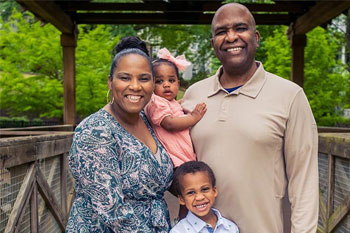 When you’re hoping to adopt an older child, it’s exciting to think the day when you’ll finally bring your adopted child home. Some adoptive parents wish to feel like an “instant family” and expect to bond with their adopted child immediately after bringing them home. Secretly, these parents may worry and feel uncertain. What if they don’t feel a connection with their adopted child?
When you’re hoping to adopt an older child, it’s exciting to think the day when you’ll finally bring your adopted child home. Some adoptive parents wish to feel like an “instant family” and expect to bond with their adopted child immediately after bringing them home. Secretly, these parents may worry and feel uncertain. What if they don’t feel a connection with their adopted child?
Lifetime has seen firsthand the special bonds that develop between adoptive parents and their children. Like many other aspects of parenting, bonding with your adopted child takes work and dedication. There are usually adjustments in the first few months for both the family and the child. One question you may have is how you can best bond with your adopted child. Here are some suggestions for bonding with an adopted child that may help you and answer this question.
The Benefits of Bonding
Bonding will help create a strong emotional attachment for you and your child throughout your years together. It will help them grow into secure, happy adults in the future. Other important benefits of bonding with your adopted child include:
- Improves the child’s brain ability to learn
- Helps the child learn how to govern their feelings
- Assists in developing self-confidence
- Helps them develop a healthy social lifestyle
- Aids in developing their conscience
- Improves their mental health
- Teaches them how to relate to others
How Can We Bond With Our Adopted Child?
There will be many adjustments to make when you bring your adopted child into your home. As you learn things about your child, they’re learning things about you and their new family. It’s a time of exploration and growth for everyone. One of the things adoptive parents should work towards is to create a bond with your child. There are many strategies on how to do this. Read on for five practical ways to bond with your child.
1. Consistent routine
Adopted children need a lifestyle that consists of routine and structure. So we suggest establishing a routine of when your child will eat, nap, play, and go to bed.
Over time, they will understand they can depend upon you to meet their needs. They will feel a sense of safety in the predictability of this routine. It seems simple, but having a consistent routine will help create a bond between you and the child.
Likewise, it’s important to be consistent with rules and discipline. Older adopted kids typically come from homes where there was little to no consistency. As a result, your child may be surprised to see you follow through on chores, rules, bedtimes, or food since it’s an entirely new experience for them.
Keep your rules simple, and be clear about what you expect. Ensure that your child understands the consequences beforehand, and then give them praise when they do a good job.
2. Give your child a little space
Everyone in your household needs space once in a while. So give your adopted child a little place of their own, whether it’s a corner with their toys and books or a special chair for them to sit in while they watch television.
Allow your child to decorate their room, and make sure to knock on the door before entering. Adopted children need to feel that this new home is their own and that they can feel comfortable staying there.
Every day around the same time, allow them to have time on their own. You can call it “rest time” or “alone time,” where they play quietly or look at books. It’s time where they can get recharged.
3. Play
Kids love to play, so be playful with your child. For example, engage them in a game of “hide and seek.” Even a little child can play this game and enjoy the fun of being found. Tell jokes and laugh with them. Children love attention, and playing with your child is a wonderful way to build a natural bond with them.
4. Be There
Adopted children need to know you are there for them at all times. You can show this by encouraging them to talk to you, even if they say upsetting things at first.
Listen to them, asking questions on how they’re feeling about certain things. Try to avoid giving them short answers or directing the conversation. Allow them the space to vent when they need.
Your child may need to talk at strange times of the day or night or call from school and want to speak with you. Or they might want to wear certain clothes or be hungry at weird times of the day.
All of these behaviors is completely normal for an adopted child. It’s your child’s way of checking to see if you care for them like you promised you would. It may be difficult for you to watch them struggle, but all of this is a necessary part of their adjustment into your family.
There are so many things for your child to learn about their new family and life. Teach them to ask for help if they don’t understand something. Remind them that’s it’s okay to need help.
Everybody needs help once in a while. When your child asks you for help, be sure to respond in a positive way that will make them want to ask you for help in the future. Also, be sure to be a good role model for your child by asking for help from other adults or your kids. It will help them see how everyone in a family supports one another.
5. Build Confidence
Adopted kids sometimes worry their adoptive family will get enraged at them if they make a mistake. Unfortunately, this concern is common, especially in older adopted kids.
Be sure to make every effort to reassure your child that you love them and are committed to them. Encourage them. Don’t just point out the good things they do, but encourage their character qualities.
So instead of saying, “You did a good job of making your bed,” you might say, “I noticed how hard you worked on your room. That’s great.”
You can build your child’s confidence by encouraging their independence with good thought-provoking questions like, “What did you notice about that story we read?” Encourage them to help you solve problems with questions such as, “What do you think we can do to help our sick next-door neighbor?”
Your child will grow in confidence as you listen to them and encourage their contributions to problem-solving in the family.
What To Do if Bonding With Your Child Isn’t Going So Well
Remain patient and consistent if bonding with your adopted child isn’t going as well as you’d hoped. Over time, as you put in the work to bond with your child, it will happen. Pray and ask God to help you and your child adjust to the new normal.
If you feel stuck, don’t be afraid to ask for help from your adoption professional, pastor, or therapist to get through this challenging time. Sometimes children have real issues that parents won’t be able to solve at home. If that’s the case, it’s beneficial to get help from an adoption-competent counselor who is experienced in helping children overcome their problems.
Founder of Lifetime Adoption, adoptive mom, adoption expert, and Certified Open Adoption Practitioner (C.O.A.P).
Since 1986, adoption expert Mardie Caldwell has been dedicated to bringing couples and birth parents together in order to fulfill their dreams.
“Many years ago, I was also searching for a child to adopt. We didn’t know where or how to get started. Through research, determination, and a prayer, our dream of a family became reality. I started with a plan, a notebook, assistance from a caring adoption consultant and a lot of hard work; this was my family I was building. We had a few heartaches along the way, but the pain of not having children was worse!
Within weeks we had three different birth mothers choose us. We were overwhelmed and delighted. Many unsettling events would take place before our adoption would be finalized, many months later. Little did I know that God was training and aligning me for the adoption work I now do today. It is my goal to share with our families the methods and plans which succeed and do not succeed. I believe adoption should be affordable and can be a wonderful “pregnancy” for the adoptive couple.
I have also been on both sides of infertility with the loss of seven pregnancies and then conceiving by new technology, giving birth to a healthy daughter. I have experienced first-hand the emotional pain of infertility and believe my experience allows me to serve your needs better.
It is my hope that for you, the prospective parents, your desire for a child will be fulfilled soon.”





0 Comments